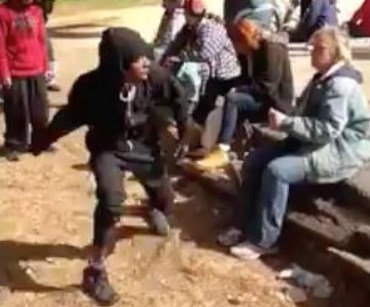I recently posted a video on my Facebook page that sparked many comments and noticed the same question coming back: why didn’t anybody do anything? This triggered this post in my “street fighting mistakes” series about expecting bystanders to help when violence breaks out. I’ll go into that below, but first, look at the video in question, if you haven’t seen it already.
Apparently, the attacker has been arrested and will get his due, so there’s that.
Some more thoughts now.
Street Fighting Mistakes: bystanders will help you
There are several aspects to this issue and the first one is that, in most modern Western societies, people assume certain things are generally true:
- There is the rule of law.
- People are not inherently violent.
- Certain lines cannot be crossed.
- People are helpful to each other.
For the most part and for the average person, these assumptions are mostly correct. Meaning, in their daily lives, these assumptions hold up consistently. As long as they don’t stray too far from their social comfort zone, this remains true. It is entirely human to then eventually expect these assumptions to hold up all the time, simply because they always have before.
That’s where the problems start.
At the fringes of these societies (with homeless people and street thugs as is the case here), the rules are different:
- Rule of law is replaced by rule of might.
- Violence is a tool that is used to get what you want. It is often the preferred tool.
- The lines are drawn elsewhere, much further than in regular society.
- You look out for yourself first and foremost.
To regular folks, this is unheard of and unacceptable. In a fringe society, it is normal. That’s the first disconnect. As a result, when many of these folks are suddenly a bystander to a violent street fight, they have two typical reactions: they freeze as they try to process what is happening or they step in, unaware of the danger to themselves. I believe the freeze is the most common one.
A secondary aspect is the dynamic where, once engaged, the human brain develops a certain inertia for the chosen course. I’m blanking on the correct term but in short, it means that the more and longer you pick a course of action, the harder it is to change it: the longer you remain a bystander while a street fight is going on, the harder it is to get yourself to act. This is an oversimplified explanation of a much more complex subject, but you get what I mean. You often see this in action when a street fight breaks out and nobody acts but when one person steps in to break it up, suddenly the rest moves too. It takes that one person breaking the collective freeze before they also act.
A third factor is decades of increasingly alienating regular people from how violence works, why it happens and how to handle it and you create an average citizen who is out of his depth when confronted with violence. It is alien to him and he does not have the tools or skills to handle it, so avoidance is an instinctive choice. Society cannot have it both ways: you can’t have zero tolerance for fighting in schools, indoctrinate generations with microaggressions, trigger warnings and the cliche of “violence never solved anything” and similar nonsense and also expect people to know how to handle violence. It takes repeated exposure and personal experience to discover the reality of violence and develop those skills. Expecting each person you meet in the street to have these skills is a mistake.
 Combine all this together and you have a bad mix that makes it more likely other people will do nothing. So if you end up fighting in the street for whatever reason, it is a mistake to expect the bystanders to help you or anyone else for that matter. It if does, great. Hurrah for humanity. But more likely than not, it won’t happen. Would it benefit society if this changed? Probably, depending on certain factors, which is a whole other discussion. But my main point is this:
Combine all this together and you have a bad mix that makes it more likely other people will do nothing. So if you end up fighting in the street for whatever reason, it is a mistake to expect the bystanders to help you or anyone else for that matter. It if does, great. Hurrah for humanity. But more likely than not, it won’t happen. Would it benefit society if this changed? Probably, depending on certain factors, which is a whole other discussion. But my main point is this:
Self-defense means defending one’s self. It does not mean expecting others to do the work for you.


Leave a Reply